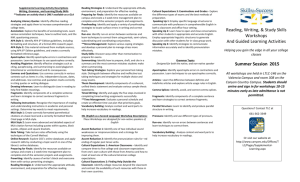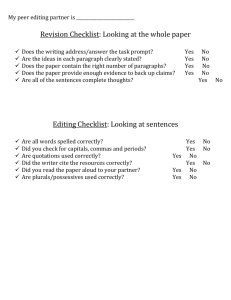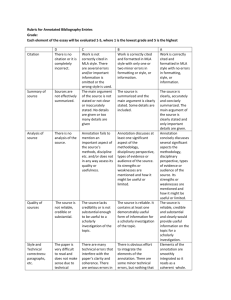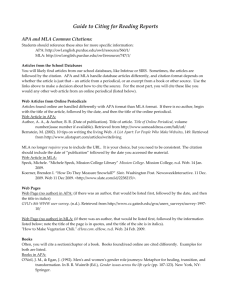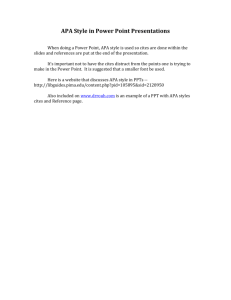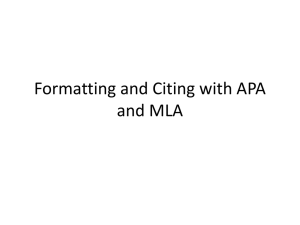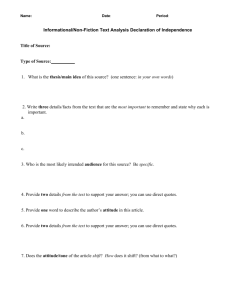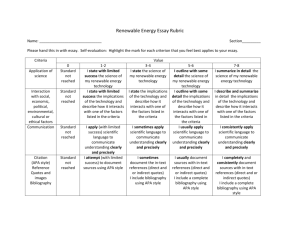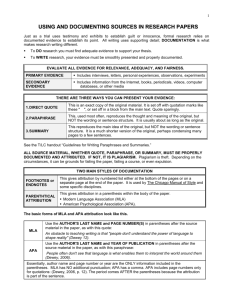Word version - College of the Canyons
advertisement
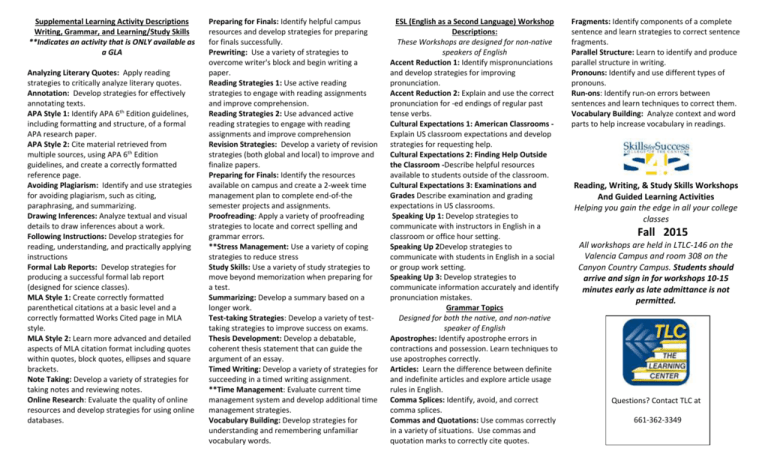
Supplemental Learning Activity Descriptions Writing, Grammar, and Learning/Study Skills **Indicates an activity that is ONLY available as a GLA Analyzing Literary Quotes: Apply reading strategies to critically analyze literary quotes. Annotation: Develop strategies for effectively annotating texts. APA Style 1: Identify APA 6th Edition guidelines, including formatting and structure, of a formal APA research paper. APA Style 2: Cite material retrieved from multiple sources, using APA 6th Edition guidelines, and create a correctly formatted reference page. Avoiding Plagiarism: Identify and use strategies for avoiding plagiarism, such as citing, paraphrasing, and summarizing. Drawing Inferences: Analyze textual and visual details to draw inferences about a work. Following Instructions: Develop strategies for reading, understanding, and practically applying instructions Formal Lab Reports: Develop strategies for producing a successful formal lab report (designed for science classes). MLA Style 1: Create correctly formatted parenthetical citations at a basic level and a correctly formatted Works Cited page in MLA style. MLA Style 2: Learn more advanced and detailed aspects of MLA citation format including quotes within quotes, block quotes, ellipses and square brackets. Note Taking: Develop a variety of strategies for taking notes and reviewing notes. Online Research: Evaluate the quality of online resources and develop strategies for using online databases. Preparing for Finals: Identify helpful campus resources and develop strategies for preparing for finals successfully. Prewriting: Use a variety of strategies to overcome writer's block and begin writing a paper. Reading Strategies 1: Use active reading strategies to engage with reading assignments and improve comprehension. Reading Strategies 2: Use advanced active reading strategies to engage with reading assignments and improve comprehension Revision Strategies: Develop a variety of revision strategies (both global and local) to improve and finalize papers. Preparing for Finals: Identify the resources available on campus and create a 2-week time management plan to complete end-of-the semester projects and assignments. Proofreading: Apply a variety of proofreading strategies to locate and correct spelling and grammar errors. **Stress Management: Use a variety of coping strategies to reduce stress Study Skills: Use a variety of study strategies to move beyond memorization when preparing for a test. Summarizing: Develop a summary based on a longer work. Test-taking Strategies: Develop a variety of testtaking strategies to improve success on exams. Thesis Development: Develop a debatable, coherent thesis statement that can guide the argument of an essay. Timed Writing: Develop a variety of strategies for succeeding in a timed writing assignment. **Time Management: Evaluate current time management system and develop additional time management strategies. Vocabulary Building: Develop strategies for understanding and remembering unfamiliar vocabulary words. ESL (English as a Second Language) Workshop Descriptions: These Workshops are designed for non-native speakers of English Accent Reduction 1: Identify mispronunciations and develop strategies for improving pronunciation. Accent Reduction 2: Explain and use the correct pronunciation for -ed endings of regular past tense verbs. Cultural Expectations 1: American Classrooms Explain US classroom expectations and develop strategies for requesting help. Cultural Expectations 2: Finding Help Outside the Classroom -Describe helpful resources available to students outside of the classroom. Cultural Expectations 3: Examinations and Grades Describe examination and grading expectations in US classrooms. Speaking Up 1: Develop strategies to communicate with instructors in English in a classroom or office hour setting. Speaking Up 2Develop strategies to communicate with students in English in a social or group work setting. Speaking Up 3: Develop strategies to communicate information accurately and identify pronunciation mistakes. Grammar Topics Designed for both the native, and non-native speaker of English Apostrophes: Identify apostrophe errors in contractions and possession. Learn techniques to use apostrophes correctly. Articles: Learn the difference between definite and indefinite articles and explore article usage rules in English. Comma Splices: Identify, avoid, and correct comma splices. Commas and Quotations: Use commas correctly in a variety of situations. Use commas and quotation marks to correctly cite quotes. Fragments: Identify components of a complete sentence and learn strategies to correct sentence fragments. Parallel Structure: Learn to identify and produce parallel structure in writing. Pronouns: Identify and use different types of pronouns. Run-ons: Identify run-on errors between sentences and learn techniques to correct them. Vocabulary Building: Analyze context and word parts to help increase vocabulary in readings. Reading, Writing, & Study Skills Workshops And Guided Learning Activities Helping you gain the edge in all your college classes Fall 2015 All workshops are held in LTLC-146 on the Valencia Campus and room 308 on the Canyon Country Campus. Students should arrive and sign in for workshops 10-15 minutes early as late admittance is not permitted. Questions? Contact TLC at 661-362-3349
